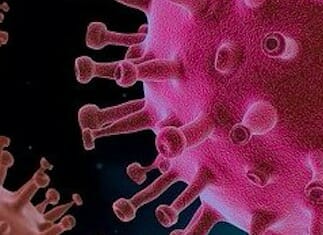New research suggests that certain Alzheimer’s blood biomarkers are associated with neurological symptoms of COVID-19 and older adults infected with SARS-CoV-2, the virus that causes COVID-19, often experience persistent cognitive impairment.
Since the novel coronavirus began raging across the world last year, scientists have come to understand that patients infected with SARS-CoV-2, the virus responsible for COVID-19, can experience symptoms far beyond those of the respiratory system. That includes neurological symptoms like confusion, foggy thinking, memory problems and difficulty concentrating — a group of symptoms collectively known as “brain fog.” For patients with what healthcare providers are calling “long COVID,” these symptoms can persist for weeks or months after their initial diagnosis of COVID-19, hindering one’s ability to carry out day-to-day activities.
New findings presented at this year’s Alzheimer’s Association International Conference now offer further insights into the long-term effects of the virus on brain health. Collectively, the findings suggest that older COVID-19 patients often experience cognitive impairment after recovering from an infection, and that biomarkers of brain injury, neuroinflammation and Alzheimer’s are closely linked with patients’ neurological symptoms.
“These new data point to disturbing trends showing COVID-19 infections leading to lasting cognitive impairment and even Alzheimer’s symptoms,” Heather Snyder, Alzheimer’s Association vice president of medical and scientific relations, said of the studies presented at the conference in a news release.
“With more than 180 million cases and nearly 4 million deaths worldwide, COVID-19 has devastated the entire world,” she added. “It is imperative that we continue to study what this virus is doing to our body and brain.”
Elevated Alzheimer’s biomarker levels found in COVID-19 Patient’s Blood
In search of biological clues of COVID-19 patients’ neurological injuries, a team of scientists studied blood samples of more than 300 older adults who were hospitalized. All of them were tested positive for SARS-CoV-2 and about half had neurological symptoms.
The researchers reported that plasma biomarker levels that indicated damaged neurons, neuroinflammation and Alzheimer’s (tau, neurofilament light chain protein, glial fibrillary acidic protein and ubiquitin C-terminal hydrolase L1) were strongly associated the neurological symptoms of COVID-19 patients.
According to Dr. Thomas Wisniewski, professor of neurology, pathology, and psychiatry at New York University Grossman School of Medicine and a scientist in study, the results suggest that COVID-19 patients may experience “an acceleration of Alzheimer’s-related symptoms and pathology.”
But, Wisniewski noted in the news release, “More longitudinal research is needed to study how these biomarkers impact cognition in individuals who had COVID-19 in the long term.”
A link between cognitive impairment and olfactory dysfunction
One of the most commonly reported neurological symptom of COVID-19 is a problem with the sense of smell (olfactory dysfunction), and a group of scientists explored whether it could reliably predict infected patients’ likelihood of experiencing chronic cognitive impairment. They assessed data of nearly 300 older adults from three to six months after recovery from a COVID-19 infection.
Results from a battery of medical tests showed that more than half of the patients experienced persistent forgetfulness. Roughly one in four participants also had cognitive problems that included issues with language and executive functioning. The researchers also reported that cognitive impairment was actually linked with the severity of persistent olfactory dysfunction, rather than the severity of an acute COVID-19 infection.
“We’re starting to see clear connections between COVID-19 and problems with cognition months after infection,” Dr. Gabriel de Erausquin, professor of neurology at the Joe R. and Teresa Lozano Long School of Medicine at UT Health San Antonio and a researcher in the study, said in the news release. “It’s imperative we continue to study this population, and others around the world, for a longer period of time to further understand the long-term neurological impacts of COVID-19.”
Physical fitness and respiratory function as predictors of COVID-19 patients’ cognitive decline
Researchers are also taking a closer look at whether physical fitness and respiratory function are associated with infected patients’ cognitive deficits. One team of researchers analyzed data of 32 COVID-19 patients two months after they were discharged from the hospital.
The scientists found that about half of the patients experienced cognitive decline. Those with lower cognitive scores were more likely to have poorer physical health and lower levels of oxygen in the blood after a brief walking test.
According to Dr. George Vavougios, postdoctoral researcher for the University of Thessaly and a scientist in the study, depleted oxygen levels is likely to be one factor that explains COVID-19 patients’ brain dysfunction.
“A brain deprived of oxygen is not healthy, and persistent deprivation may very well contribute to cognitive difficulties,” Vavougios said in the news release. “These data suggest some common biological mechanisms between COVID-19’s dyscognitive spectrum and post-COVID-19 fatigue that have been anecdotally reported over the last several months.”
Leveraging the brain’s neuroplasticity
The good news is that the brain is a remarkably flexible organ, one that has the ability, or neuroplasticity, of rewiring its neural circuits, forming new connections between neurons and adapting to its environment, experts say.
Accordingly, clinicians urge COVID-19 patients experiencing persistent cognitive issues to see a neurologist as brain rehabilitation is critical to restoring their brain health. Health care providers have set up specialized clinics to care for infected patients with lingering symptoms. Doctors are applying brain rehabilitation techniques for COVID-19 long-haulers, and clinical trials are underway to develop new treatments for infected patients with neurological symptoms.



